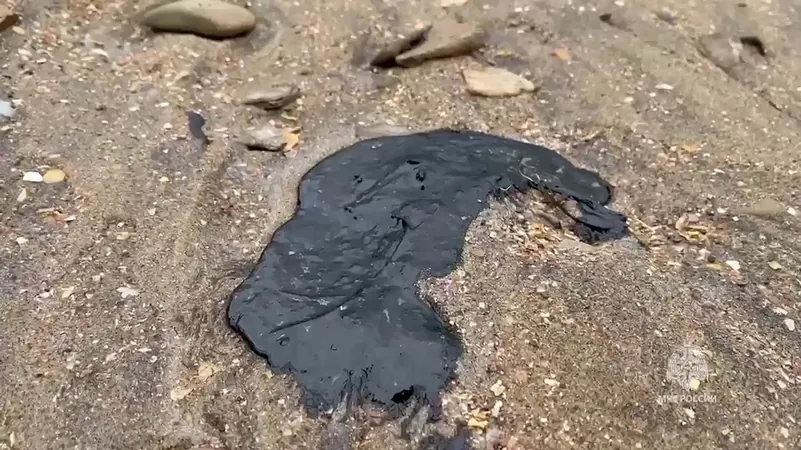
‘Ecological Disaster’ Strikes: Oil Spill from Russian Tankers Hits Sevastopol Shores!
2025-01-04
Author: Ling
Introduction
A significant environmental crisis is unfolding as oil from two damaged Russian tankers has been discovered off the coast of Sevastopol, the largest city in Crimea, which has been annexed by Moscow. The incident came to light on Friday, with local officials confirming the presence of the oil slick.
Details of the Incident
The two tankers, named Volgoneft-212 and Volgoneft-239, succumbed to a severe storm last month while navigating the Kerch Strait, a crucial maritime route connecting Crimea to southern Russia. In a dire turn of events, one of the vessels sank, while the other ran aground, releasing approximately 2,400 tonnes of a heavy fuel oil known as mazut into the nearby waters. Mikhail Razvozhayev, the head of the city installed by Moscow, reported via Telegram that a small oil slick about 1.5 meters (five feet) wide had reached the shores of Sevastopol.
Impact on Sevastopol
Sevastopol is home to over half a million residents and serves as the historic base for the Russian Navy's Black Sea fleet, making it a significant target for Ukraine during the ongoing conflict. The Russian emergencies ministry has previously shared images showcasing clean-up efforts taking place on a nearby beach in Krasnodarskiy Kray, which is east of Crimea.
Government Response
President Vladimir Putin has labeled the oil spills an "ecological disaster," prompting the mobilization of hundreds of volunteers tasked with removing contaminated soil from affected beaches in Crimea and along Russia's southern coast.
Challenges of Clean-Up Amidst Conflict
The transport ministry has indicated that the mazut spilled presents substantial challenges for clean-up due to its dense and heavy nature, which causes it to sink rather than float on the water's surface. This incident marks the first known occurrence involving M-100 grade mazut, and the transport ministry noted, "There is no proven technology anywhere in the world to remove it from the water column." As such, the primary method of addressing the spill involves collecting the substance from the shoreline post-incident.
To date, approximately 78,000 tons of contaminated soil and sand have been extracted from local beaches, with estimates suggesting that up to 200,000 tonnes may ultimately need to be cleared away. According to Iryna Babanina, a researcher at the Conflict and Environment Observatory (CEOBS) in the UK, Russian clean-up efforts have faced significant hurdles due to inadequate equipment. Furthermore, the ongoing war has restricted what coordinated actions could typically address such an emergency.
"Deploying specialized vessels, aircraft, and other necessary equipment is impossible due to the war," warned Babanina. The lack of effective information sharing between countries has compounded the issue; currently, satellite imagery remains one of the few reliable means to assess the situation accurately.
Ukraine Points Fingers at ‘Shadow Fleet’
In response to the spill, Ukraine has vocally condemned Russia, accusing it of attempting to transport oil through vessels that are ill-equipped for harsh winter sea conditions. Under increasing Western sanctions, Russia has resorted to utilizing a ‘shadow fleet’ composed of primarily older tankers for the export of its fuels globally.
While the origin and true purpose of the Volgoneft-212 and Volgoneft-239 remain unclear, the escalation of the ‘shadow fleet’ phenomenon has been termed an "environmental time bomb" by experts like Babanina. She raised serious concerns regarding the oversight of ship safety and accountability in the event of such disasters, stating, “It’s not clear how the safety of such ships is controlled and who is responsible in case of the disaster.”
Conclusion
This incident highlights the burgeoning environmental crises resulting from the ongoing conflict, as Russia continues to face backlash for its actions since it annexed Crimea in 2014, following the pro-European Union revolution in Ukraine. As the situation develops, the potential for further ecological damage looms ominously over this embattled region.

 Brasil (PT)
Brasil (PT)
 Canada (EN)
Canada (EN)
 Chile (ES)
Chile (ES)
 Česko (CS)
Česko (CS)
 대한민국 (KO)
대한민국 (KO)
 España (ES)
España (ES)
 France (FR)
France (FR)
 Hong Kong (EN)
Hong Kong (EN)
 Italia (IT)
Italia (IT)
 日本 (JA)
日本 (JA)
 Magyarország (HU)
Magyarország (HU)
 Norge (NO)
Norge (NO)
 Polska (PL)
Polska (PL)
 Schweiz (DE)
Schweiz (DE)
 Singapore (EN)
Singapore (EN)
 Sverige (SV)
Sverige (SV)
 Suomi (FI)
Suomi (FI)
 Türkiye (TR)
Türkiye (TR)
 الإمارات العربية المتحدة (AR)
الإمارات العربية المتحدة (AR)